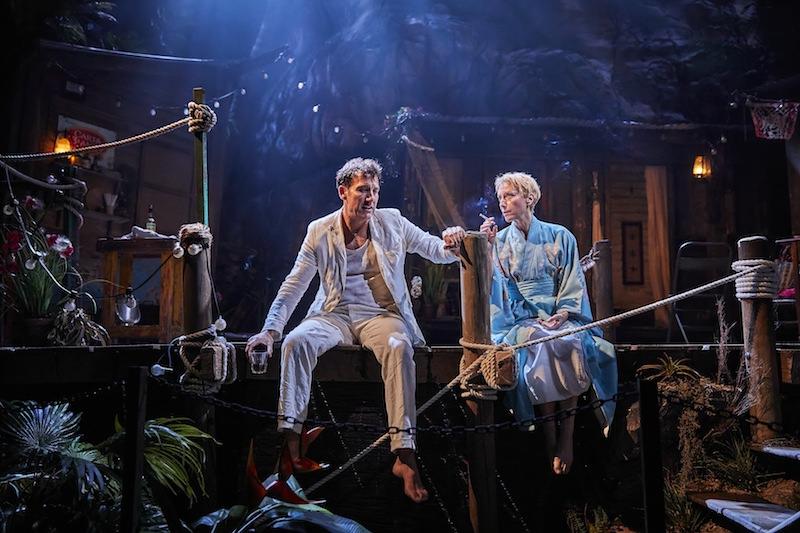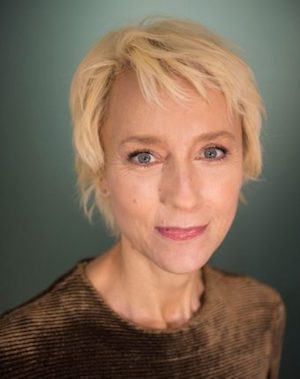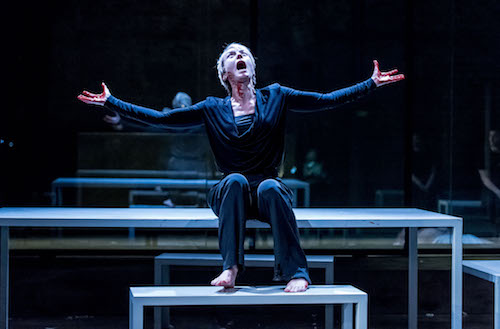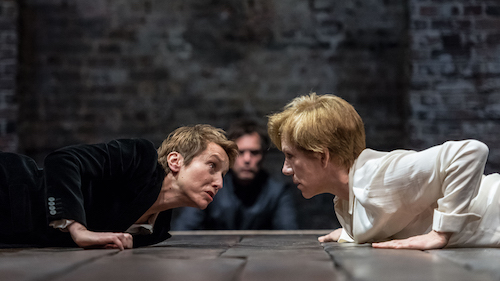theartsdesk Q&A: Lia Williams on the challenges of theatre | reviews, news & interviews
theartsdesk Q&A: Lia Williams on the challenges of theatre
theartsdesk Q&A: Lia Williams on the challenges of theatre
As 'The Night of the Iguana' opens, the actor renowned for playing dual roles talks Tennessee Williams, Pinter - and Wallis Simpson

Lia Williams is not an actor who looks for easy options. Twice she has played two characters in the same production, switching between them for different performances.
Born in Birkenhead, the young Lia set her heart on acting but - astonishingly in retrospect - was turned down by drama schools. Undaunted, she set off for London and plunged into the profession, determined never to rely on a second string. She first came to notice in Ayckbourn's The Revenger's Comedies in 1991, winning the Critics' Circle's Most Promising Newcomer award for that year. In 1997 she was nominated for a Tony for David Hare's Skylight, opposite Michael Gambon. As well as a string of successes on stage, she has been nominated for a BAFTA, for playing a woman with dissociative identity disorder in the BBC's May 33rd, in 2005. More recently, she has herself turned to directing, on stage and screen and, in 2008, her short film, The Stronger, was nominated for the Best Short Film award at the BAFTA Film Awards.
Lia Williams lives in London with her husband, writer Guy Hibbert. Her son, Joshua James, is also an actor.
HEATHER NEILL: You have had considerable success on screen, but you have said that theatre is your favourite medium, despite having described it as "nine million times harder".
 LIA WILLIAMS: Well, it's live, so there's more at stake and also the story can change every night because the audience is part of the play, feeding into how you play it. There's an element of unknown. Also, you are in control of your performance, so there's a chance that sometimes you might fail or be very different from the last time. At each performance, you are sculpting at the role, working at it, and I find that incredibly exciting. And when you get a moment of recognition in the theatre, when the audience react as if they are one person, a moment of silence can be more exciting than applause or laughter, as if there's a moment of mutual understanding in the room. I find that exhilarating: we are communicating properly as human beings. That's being dismantled somewhat in the way we live now because of social media etc. In film and TV you don't have the same connection, of course, and you can't have a connection with the character in the same way because your performance is in the charge of an editor. But I do love filming as well!
LIA WILLIAMS: Well, it's live, so there's more at stake and also the story can change every night because the audience is part of the play, feeding into how you play it. There's an element of unknown. Also, you are in control of your performance, so there's a chance that sometimes you might fail or be very different from the last time. At each performance, you are sculpting at the role, working at it, and I find that incredibly exciting. And when you get a moment of recognition in the theatre, when the audience react as if they are one person, a moment of silence can be more exciting than applause or laughter, as if there's a moment of mutual understanding in the room. I find that exhilarating: we are communicating properly as human beings. That's being dismantled somewhat in the way we live now because of social media etc. In film and TV you don't have the same connection, of course, and you can't have a connection with the character in the same way because your performance is in the charge of an editor. But I do love filming as well!
You fell in love with Tennessee Williams when you were very young, didn't you?
Yes, his work is important to me. His writing is very brave and he seems able to tap into the human soul. He has this ability to be totally colloquial, accessible to everyone, and yet poetic at the same time. And his characters are complete people; they are flawed, neither wholly good nor bad.
Williams put a lot of himself into his characters, perhaps in this play even more than usual?
Yes, he's in all his characters, especially Shannon, but Hannah and Maxine too. They are not easy characters, all troubled people. It was his last great play, his most spiritual and most revealing about himself. It's thrilling, but it's demanding. The thing about Tennessee is you cannot, as an actor, lie. You have to be raw. You have to be truthful. And those things are difficult. They demand that you give a lot.
Shannon, the disgraced priest who parted company with his church after announcing God to be a senile delinquent is - like the captured iguana - "at the end of his rope". As the play opens, he is accused of the statutory rape of a teenage girl among the group of tourists he is leading. He could be assumed to be Hannah's opposite. She is a spinster who has travelled the world with her grandfather for 25 years, making ends meet by sketching people while Nonno writes poetry. Have she and Shannon anything in common?
They are not dissimilar, but they have dealt with their life challenges differently. Part of their attraction to each other is that they recognise the demons, but she's dealt with hers and he can't. He throws them out all around him, into the air, and she contains everything and sits on it. They are yin and yang in a way.
What are her demons?
Her parents were killed in a car crash when she was young and I think she's poured everything into her life with Nonno, her grandfather. This is her choice. They have a profound, close relationship and I think they travel to escape from the grief of the car crash. She's decided not to go near love again because it exposes you to damage and the possibility of things crashing within you. She'd sooner die alone than open her heart up. It's a brutal life choice, but I think Williams has decided that she will be stronger in the world and more compassionate if she remains alone. For all her fragility, she has this incredible strength at her core. They were difficult times for a woman to travel [the play is set in Mexico in 1940], but, boy, she has done that. She's a cool hustler as well, a poker player, a layered character, not an innocent in the world. I imagine she comes from quite a Bohemian background. I think Nantucket would have driven her mad.
You have played other Tennessee Williams women, Alma in Eccentricities of a Nightingale and Blanche in A Streetcar Named Desire, both in Dublin. How does Hannah compare?
I see Hannah as Tennessee's guiding light, somebody he invented to watch over him, who might steady him. I think he kind of willed her into life to look after him because it's a play about how to live beyond despair. He never wrote another character from New England, so I think he's given her this otherness. She has real compassion and grace and forgiveness for the human condition.
You have sometimes had to adopt different accents, including Morningside for Miss Jean Brodie. How does your Hannah speak?
I'm inventing from scratch, not copying what's gone before. I've formulated something that is its own thing, given that she's travelled for 25 years. I've done some research on Sylvia Plath and Katharine Hepburn, an interesting mix: Plath an American who lived in Cambridge and Hepburn, a Bostonian, a New Englander. I've kind of pulled together some things to create something unique to Hannah to underline her otherness.
You are known to be a stickler for research, whatever the part. When you played Blanche, didn't you travel up the Mississippi to Tennessee Williams' home?
Yes, I went to Clarksdale, where Tennessee lived with his grandfather, and I met Kenneth Holditch who was a lecturer and knew Tennessee. I tried to get as near to him as I could. I always try to do that with writers because I think the closer you get to their voice, the closer you can get to the truth of the character. I also went to New Orleans, so when I walked out as Blanche, I could hear the sound of New Orleans. It was an amazingly indulgent research trip! And I've read everything about him, of course.
I assume your preparation for particular roles varies, but what happened before Old Times in 2013, with the rest of the cast and director Ian Rickson, must have been unusual?
Yes! We all went and lived in Norfolk. In a snowstorm. We were cooking meals and walking on the beach, doing everything in character. It was an extraordinary experience.

You have had a special relationship with Pinter's work, having acted in his plays, been directed by him (in the original production of Mamet's Oleanna in 1993) and yourself directed Ashes to Ashes as part of the Pinter at the Pinter season. What qualities do you admire in his work?
I love Pinter. I worked with him nine times and then directed Ashes to Ashes. I have quite a musical ear I think and he writes the equivalent of jazz. Harold was the most gifted writer and poet. He's also brilliant at revealing humanity by covering it up. He's very good at people saying things that are different from what they are thinking. I met him very early in my career and he taught me a great deal. One of his greatest lessons was that the only thing that matters in the world is the line you're speaking, so that everything has a kind of razor-blade edge to it and a sense of urgency and importance. That in theatre is thrilling to watch. He taught me some really good acting tips! He was a brilliant actor too, of course. It was thrilling to be directed by him in Oleanna. He was a very sensitive director and very loyal to the actors that he worked with - almost a company of the same actors for each project.
Was directing Ashes to Ashes at all daunting?
I absolutely loved it! Kate O'Flynn and Paapa Essiedu were so perfect. I took the threat out of it - you know, the classic Pinter aggression - and made it a love story, about two people who were struggling, but a love story nevertheless.
Directing - on stage or screen - is fantastic because you are looking at the whole picture, not just your journey through it, but the whole painting. That's a real privilege. It wasn't a career choice; it was an instinctive move. I couldn't not act, but directing feeds the acting.
Pinter is such a contrast to Tennessee Williams, who expresses so much emotion in his work.
Yes, while Harold sits on it. But I think they both write about big themes, how we behave towards each other, who we are in the world and our responsibilities to each other.
Do you find that you can switch off after playing a demanding role like Hannah?
No. I find that bit really hard. Tennessee can torment you in that way, shake you. You have to deliberately find things to do that will lift you out of it. For me that's walking in London's beautiful parks. Or - as Hannah says - taking a few deep breaths.
You are also very much involved with the real world, commenting on twitter on the political situation, for instance.
I think we have to be. It informs our work - and I'm naturally curious. I think the proudest thing is that I'm a patron of Clean Break [the theatre company for women who have had experience of the criminal justice system]. They do fantastic work and I support them in any way that I possibly can. I feel really excited to be engaged in their work and I want to grow that and do more.
Does The Night of the Iguana have anything particular to say at this moment, about the role of women, for instance?
What I love about it is that it's not being driven by anything fashionable at the moment, by what social media is chatting about, politically what is correct. It takes on big, difficult subjects, with complex characters who are flawed. That's why I'm doing it, because it's representing something bigger than the discussion that's going on right now, which I think is important, but linear. Hannah has phenomenal strength, but she's everything else as well, funny and fragile - and a bit of a mess, actually. And that's what makes it exciting. We are very quick to judge people. There's very little room for nuance at the moment and that's why I want to take on a big play that asks difficult questions about who we are. And about a very old-fashioned idea of compassion, generosity of spirit and kindness, which is not popular right now. Kindness and lack of judgement are very important in this play.

At least you are playing the same role every night, unlike in Old Times and Mary Stuart.
Yes! In Mary Stuart (pictured immediately above, with Juliet Stevenson, credit Manuel Harlan) the roles complemented each other, so it was the most phenomenal acting feat - something like 1300 lines and you genuinely didn't know who you were playing each night. There was a kind of freedom in that because you just had to throw yourself over the edge of a cliff! But I think theatre acting is like that anyway.
Among your screen roles, Alice, the foster mother who does not always do the right thing in Channel 4's Kiri was especially memorable.
I loved that. I thought Alice was a particularly complicated, recognisable human being. That's really intelligent writing.
And how did you like being Wallis Simpson in The Crown?
I loved Wallis! She was a real one-off. I like playing one-offs! She was humorous too. I love comedy because it's part of tragedy; nothing is ever one thing.
What roles are we likely to see you in next?
I'm in His Dark Materials on television, playing Dr Cooper, a baddie scientist, which was huge fun. And I have a leading role in a series called The Capture, which is a BBC drama. I play an MI5 agent. I'm part of the dark arts - I flip between MI5, MI6 and CIA. It's a really well-written six-parter.
- The Night of the Iguana runs at the Noël Coward Theatre until 28 September
- The UK air date for His Dark Materials on the BBC is to be announced shortly
Explore topics
Share this article
The future of Arts Journalism
You can stop theartsdesk.com closing!
We urgently need financing to survive. Our fundraising drive has thus far raised £49,000 but we need to reach £100,000 or we will be forced to close. Please contribute here: https://gofund.me/c3f6033d
And if you can forward this information to anyone who might assist, we’d be grateful.

Subscribe to theartsdesk.com
Thank you for continuing to read our work on theartsdesk.com. For unlimited access to every article in its entirety, including our archive of more than 15,000 pieces, we're asking for £5 per month or £40 per year. We feel it's a very good deal, and hope you do too.
To take a subscription now simply click here.
And if you're looking for that extra gift for a friend or family member, why not treat them to a theartsdesk.com gift subscription?
more Theatre
 Ragdoll, Jermyn Street Theatre review - compelling and emotionally truthful
Katherine Moar returns with a Patty Hearst-inspired follow up to her debut hit 'Farm Hall'
Ragdoll, Jermyn Street Theatre review - compelling and emotionally truthful
Katherine Moar returns with a Patty Hearst-inspired follow up to her debut hit 'Farm Hall'
 Troilus and Cressida, Globe Theatre review - a 'problem play' with added problems
Raucous and carnivalesque, but also ugly and incomprehensible
Troilus and Cressida, Globe Theatre review - a 'problem play' with added problems
Raucous and carnivalesque, but also ugly and incomprehensible
 Clarkston, Trafalgar Theatre review - two lads on a road to nowhere
Netflix star, Joe Locke, is the selling point of a production that needs one
Clarkston, Trafalgar Theatre review - two lads on a road to nowhere
Netflix star, Joe Locke, is the selling point of a production that needs one
 Ghost Stories, Peacock Theatre review - spirited staging but short on scares
Impressive spectacle saves an ageing show in an unsuitable venue
Ghost Stories, Peacock Theatre review - spirited staging but short on scares
Impressive spectacle saves an ageing show in an unsuitable venue
 Hamlet, National Theatre review - turning tragedy to comedy is no joke
Hiran Abeyeskera’s childlike prince falls flat in a mixed production
Hamlet, National Theatre review - turning tragedy to comedy is no joke
Hiran Abeyeskera’s childlike prince falls flat in a mixed production
 Rohtko, Barbican review - postmodern meditation on fake and authentic art is less than the sum of its parts
Łukasz Twarkowski's production dazzles without illuminating
Rohtko, Barbican review - postmodern meditation on fake and authentic art is less than the sum of its parts
Łukasz Twarkowski's production dazzles without illuminating
 Lee, Park Theatre review - Lee Krasner looks back on her life as an artist
Informative and interesting, the play's format limits its potential
Lee, Park Theatre review - Lee Krasner looks back on her life as an artist
Informative and interesting, the play's format limits its potential
 Measure for Measure, RSC, Stratford review - 'problem play' has no problem with relevance
Shakespeare, in this adaptation, is at his most perceptive
Measure for Measure, RSC, Stratford review - 'problem play' has no problem with relevance
Shakespeare, in this adaptation, is at his most perceptive
 The Importance of Being Earnest, Noël Coward Theatre review - dazzling and delightful queer fest
West End transfer of National Theatre hit stars Stephen Fry and Olly Alexander
The Importance of Being Earnest, Noël Coward Theatre review - dazzling and delightful queer fest
West End transfer of National Theatre hit stars Stephen Fry and Olly Alexander
 Get Down Tonight, Charing Cross Theatre review - glitz and hits from the 70s
If you love the songs of KC and the Sunshine Band, Please Do Go!
Get Down Tonight, Charing Cross Theatre review - glitz and hits from the 70s
If you love the songs of KC and the Sunshine Band, Please Do Go!
 Punch, Apollo Theatre review - powerful play about the strength of redemption
James Graham's play transfixes the audience at every stage
Punch, Apollo Theatre review - powerful play about the strength of redemption
James Graham's play transfixes the audience at every stage
 The Billionaire Inside Your Head, Hampstead Theatre review - a map of a man with OCD
Will Lord's promising debut burdens a fine cast with too much dialogue
The Billionaire Inside Your Head, Hampstead Theatre review - a map of a man with OCD
Will Lord's promising debut burdens a fine cast with too much dialogue

Add comment